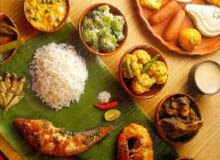We attend a lot of Bengali parties. Usually, at a party in someone's home, my friends and I hang out in a separate room away from the adults. We try to avoid them (especially me) because they are sure to ask me to sing or one of my friends to do something. And that's the last thing we want to do! They have their own music and recitation sessions!
The fun part though is that everyone has a great time. We chat, play games, and of course when you go to a party there is always food.....right? At Bengali parties, they serve you Indian food. Sometimes it can be very spicy. Some of the kids who are not used to eating spicy food sit down with 2 to 3 glasses of water, and I am one of them. About the spiciest thing I can eat is black pepper! My dad has four to five green chillies with his dinner!
The parties usually last till 12:00 am, sometimes ending at 1:00 am. By the time a party is over, everyone is tired, yawning, and falling asleep. My dad dozes off at the party itself by 11:00 p.m. and the same goes for my sister. Most of the times we have to carry her to the car. Sometimes one can have enough of it!
The fun part though is that everyone has a great time. We chat, play games, and of course when you go to a party there is always food.....right? At Bengali parties, they serve you Indian food. Sometimes it can be very spicy. Some of the kids who are not used to eating spicy food sit down with 2 to 3 glasses of water, and I am one of them. About the spiciest thing I can eat is black pepper! My dad has four to five green chillies with his dinner!
The parties usually last till 12:00 am, sometimes ending at 1:00 am. By the time a party is over, everyone is tired, yawning, and falling asleep. My dad dozes off at the party itself by 11:00 p.m. and the same goes for my sister. Most of the times we have to carry her to the car. Sometimes one can have enough of it!



